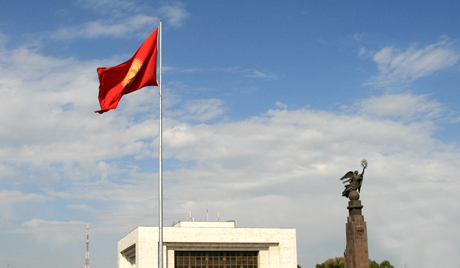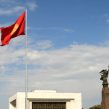
Kyrgyzstan Learns to Survive in Chaos
Publication: Eurasia Daily Monitor Volume: 7 Issue: 111
By:

Amid corruption scandals and ongoing instability it is easy to write off Kyrgyzstan as a state destined to fail due to its dishonest political leaders and impoverished economy. However, despite the fact that the provisional government has not filled all its ministerial seats and faces numerous domestic challenges, there is a strong sense of normality in Kyrgyzstan’s daily life. As local NGO groups like to describe it: “despite troubled government, life continues in Bishkek.” Indeed, in the past two months Kyrgyzstan has changed from being a country where dynastic succession of state power was most likely to a place with free media and active civic engagement.
Most people in Kyrgyzstan are deeply politicized and realize that although poor, the country is still freer compared to its Central Asian neighbors. Locals distrust the provisional government, suspecting that it will soon succumb to the levels of corruption endemic in the previous regime (www.time.kz, June 2). The possibility of the April 7 regime change resulting in yet another corrupt and authoritarian leadership further reinvigorates political sentiments among urban and rural residents.
The general sense of chaos in the country often overshadows some important positive signs in Kyrgyzstan’s politics. For instance, the draft constitution will be distributed in three languages – Kyrgyz, Russian and Uzbek, showing that the incumbent power is struggling to sustain inter-ethnic peace. The government has managed to end the curfew in Jalalabad imposed after the outbreak of inter-ethnic tensions between Kyrgyz and Uzbek residents in mid May. Almost simultaneously, the Uzbek government withdrew its heavy armor from its Sokh enclave on Kyrgyzstan’s territory (www.24,kg, June 2).
Furthermore, the number of analytical articles reflecting ongoing developments in the country has been increasing, with experts from various backgrounds seeking to voice their opinions in prestigious online and print outlets. New appointments to public offices testify to the fact that the provisional government’s promise to attract professionals is at least being partially fulfilled (www.akipress.kg, June 2).
Such increasing pluralism in the public space inevitably leads to greater levels of transparency and a vibrant debate about ongoing political developments. Similar to the 1990’s, journalists are free to publish their own commentaries and NGO’s actively participate in the political process. Unlike the aftermath of the regime change in 2005, when local civil society showed its unconditional support towards the newly established regime to sustain a sense of stability in the country, most media outlets today are ready to scrutinize the provisional government’s every decision.
Overall, there is great uncertainty about how the country’s political life will evolve in the coming months and whether the provisional government will prove able to maintain stability in the country. It is still unclear if the June 27 referendum will adequately support the new constitution. Yet, precisely due to this uncertainty, more opportunities are opening up for aspiring politicians seeking to participate in the October parliamentary elections.
The uncertainty is likely to continue to increase before the parliamentary elections in October. Already, prominent members of the provisional government have engaged in dirty tricks to challenge opponents (EDM, May 27). Nevertheless, the recent disclosure of recorded telephone conversations between senior government officials and the momentous increase of free media in the country might prove that political leaders engaged in large-scale corruption risk being exposed to the wider public.
The threat of the Bakiyev family’s intervention in Kyrgyzstan is currently waning. The provisional government has recently requested Interpol’s help in arresting Kurmanbek Bakiyev. Unlike his son, who has also been placed on Interpol’s wanted list but whose location is currently unknown, the former president’s current residence in Belarus is a known fact. His host, President Alyaksandr Lukashenka, has lately hinted that Bakiyev should leave Belarus, probably returning to Kyrgyzstan. Reports suggest that Lukashenka is no longer interested in providing Bakiyev with a safe refuge (Novaya Gazeta, Ogonek, May 31).
Meanwhile, the US Department of Defense has announced that it will terminate refueling its tankers at Manas as it renegotiates fuel prices with the provisional government. For the time being it is redirecting its fuel tankers elsewhere as it continues its talks with the provisional government over whether to continue using the base. Details of these negotiations remain undisclosed and there has been no official comment from Bishkek. Potentially, however, increased transparency of fuel contracts will improve the tarnished image of the US in Kyrgyzstan and decrease corruption rates among Kyrgyz state leaders. Ensuring transparent oversight of US-Kyrgyz cooperation on Manas might also prove to be the most important issue in the bilateral relationship.




